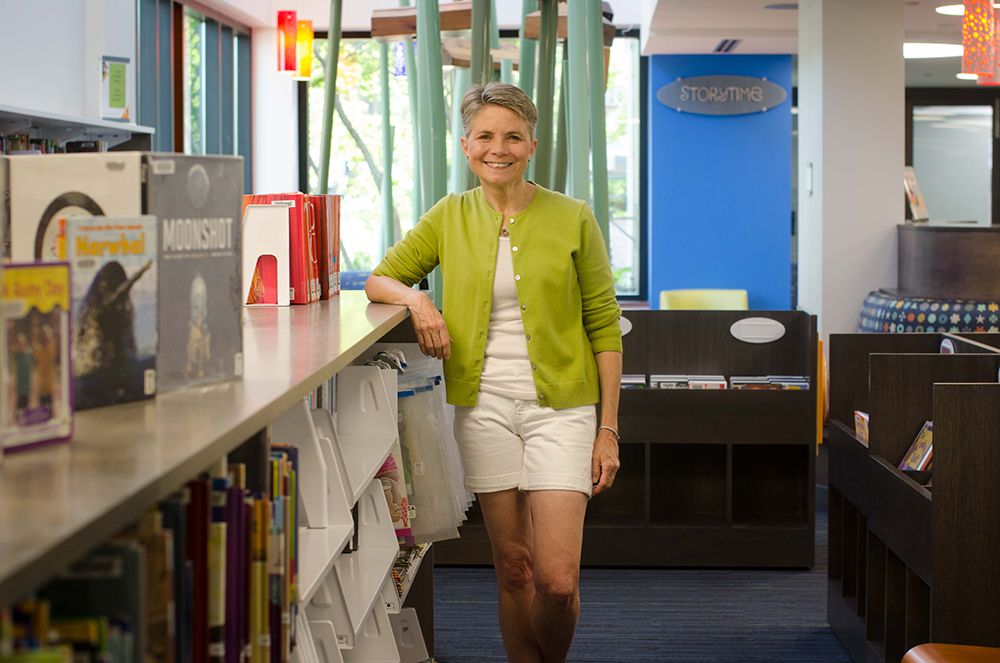Parent educator Susan Walker collaborates with students who, like her, have found a calling working with families.
“I love the fact that the majority of the students I work with have found their passion,” says Walker. “They have such a great sense of direction.”
Today Walker is an associate professor of family social science and director of the U’s parent and family education program. But her own path took her many places before she found a home in parent education. She began college in the 1970s as a theatre major at Ohio Wesleyan University but transferred into the nutrition program at Philadelphia’s Drexel University, where she completed her bachelor’s degree and then went on to get her master’s in nutritional science at Penn State.
Walker spent the next decade working as a nutritionist holding a wide range of positions, including corporate health, private practice eating disorder treatment and public health nutrition, and the federal Women, Infants, and Children (WIC) supplemental nutrition program.
“What those ten years as a nutritionist did was allow me to be with people and really listen to people,” Walker says. “And I found that I was far more interested in the influences on people’s lives and their own development than I was on what they ate.”
Realizing her interest in human development, Walker returned to school and earned her Ph.D. in child and family studies from the University of Wisconsin-Madison. Two experiences aligned and pointed her in the direction of parent education in particular: She started work with a faculty member and extension specialist in community-based parent education and support—who became her mentor and doctoral adviser—and she became a parent herself.
“Boom, and that was it,” Walker says. “That was the direction for the rest of my life.”
She realized that promoting supports to strengthen parents’ roles in children’s lives was the perfect outlet for her talents and passion for using teaching, research, and advocacy for good.
In 2007, after a dozen years at the University of Maryland as a cooperative extension state specialist and faculty member in family science, Walker and her family (which includes her now 21-year-old daughter, her husband, and a Pug named Audrey) moved to the Twin Cities, where she joined the University of Minnesota faculty. Her teaching and research has focused on three areas: understanding parenting and parent development, social and educational contexts that support parents, and professionals who work with parents.
Walker is invested in the professional development of students as well as developing the parent and family education program itself. She also enjoys partnering with organizations on a local and national level.
She credits her theatre background with giving her the creative skills necessary to be an effective teacher. And that means passion about her students:
“I am just so fueled by all the different students that I work with,” she says.
Creating community
Walker is a believer in the power of community. Her regular collaboration with Minnesota’s Early Childhood Family Education (ECFE) is an example.
For 40 years, ECFE has operated through school districts statewide, offering parent-child programming and parent education services to all families regardless of family structure or income level. At ECFE, parent educators facilitate weekly two-hour classes for parents and children.
Walker regularly collaborates with ECFE, providing assistance with outreach, program development, and evaluation. In addition, many of the students from the teacher licensure program she oversee at the U go on to work with ECFE after graduation, so her work supports the organization on multiple levels.
For the past three years, Walker has been collaborating with other researchers to develop a web platform for ECFE that can offer parents support and learning opportunities even when they’re not in the “classroom.” She sees technology as a way to offer families resources in addition to (not in place of) what ECFE already provides.
“I’m very interested in the social dynamics of people’s lives and how we are supports to each other and how we influence each other,” Walker says. “And so it just makes sense to explore technology and the internet, because enhancing possibilities for social connections is one of the big affordances that the virtual environment provides.”
Technology has also helped facilitate a connection between the College of Education and Human Development (CEHD) and the University of Iceland. Over the past few years, Walker and faculty colleagues there have worked together to create a way for Icelandic students to participate in two Department of Family Social Science graduate-level online classes in parenting. The program, set to launch this fall, is a part of a collaboration between the two schools to help the University of Iceland’s school of education develop its own parent and family education program.
Relationships are the key
Because of CEHD’s emphasis on education, diversity, and the social condition, Walker says it’s a good place for students and faculty to come together.
“Explore the possibilities,” she advises students. “There’s nothing CEHD doesn’t do… You will very likely find people who are doing what you are interested in. And there are many opportunities to intersect with other parts of campus.”
Opportunities to reach out to the surrounding community motivate Walker. Her position allows her to advocate for parents and families from many angles.
Relationships are key to making a difference, says Walker. When she teaches, she forms relationships with students while training them to form their own meaningful relationships in their future work with families.
Every parent needs help and support, and so the fact that my career is devoted in many ways to that end goal of supporting parents—that floats my boat,” she says. “That’s a really good reason why I’m on the earth.”
Learn more about Susan Walker and the Department of Family Social Science.
Story by Ellen Fee | June 2015
